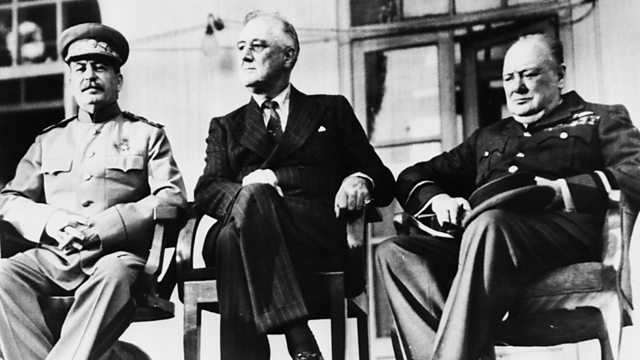USSR-UK-France-US before and after the war. The Tehran Conference 1943: the end of the communist party?
Hobsbawn declares in his autobiography: 1943 it seemed that Moscow was calling into question the future of the communist party. The Communist International was dissolved that year.
The significance of the Tehran Conference held in 1943 between the three Allied WWII powers (Stalin/Churchill/Roosevelt) may be beyond an important strategic meeting between the three leaders. It is usually described as a strategic meeting that greatly shaped the course of WWII: USSR committed to enter the war against Japan once Germany was defeated, Roosevelt and Stalin convinced Churchill to reconquer France first through the North (Operation Overlord) and then through the South (Operation Dragoon), which would ease the pressure upon the soviet army who then attack Germany's Eastern flank (Operation Bagration). Also, Roosevelt secured the reincorporation of the
Republics of Lithuania, Latvia, and Estonia into the Soviet Union only
after the citizens voted on those actions. Stalin would not consent to
any international control over the elections and stated that all issues
would have to be resolved in accordance with the Soviet Constitution. They also agreed to supply arms to Yugoslavia, and try to persuade Turkey to enter the war (and in case Bulgaria will go against Turkey, then the USSR would enter the war against Bulgaria). Also there were some preliminary discussions about establishing the UN.
In any case, Hobsbawn explains that Stalin announced Communist Party members after the conference that the PC would continue to collaborate after the war. Immediately US Communist Party was dissolved. ( https://www.marxists.org/history/international/comintern/sections/france/1945/dissolution-communist-party-usa.htm )
It was then that the communist American leader, Earl Browder, announced that capitalism and socialism had started a common path of peaceful coexistence and collaboration. What the British CP called the new Tehran line.
However, before the war Hobsbawn mentions that in 1939 the Communist Party changed its politics. It said that a possible war was not against fascism, and that France and the UK was as bad as Nazi Germany. France immediately outlawed the Communist Party. UK and France relations with the USSR were greatly severed after the USSR invaded Finland. He declares "the behavior of French and UK governments after the invasion of Finland, made much more credible the idea that Western powers were more interested in fighting communist than Hitler".
---------------------------------------------------------------------------------------------------------------------
Here some random data, about USSR invasion of Finland, which resembles somehow Ukraine nowadays, for future thought.
https://digitalcommons.cedarville.edu/cgi/viewcontent.cgi?article=1037&context=channels
Finland, was formerly part of the Russian Empire and was supported by Germany, against USSR. USSR invaded Finland, after many diplomatic discussions, fearing that Germany could attack USSR through Finland. After Anschluß Österreichs USSR distrusted Germany's territorial ambitions.
- About Uk/France reactions to USSR's invasion of FinlandDuring the early stages of World War II, the United Kingdom and France made a series of proposals to send troops to assist Finland against the Soviet Union during the Winter War, which started on 30 November 1939. The plans involved the transit of British and French troops and equipment through neutral Norway and Sweden. The initial plans were abandoned because Norway and Sweden declined transit through their land for fear that their countries would be drawn into the war. The Moscow Peace Treaty ended the Winter War in March 1940, which precluded the possibility of intervention.
The Anglo-German Naval Agreement (AGNA) of 18 June 1935 was a naval agreement between the United Kingdom and Germany regulating the size of the Kriegsmarine in relation to the Royal Navy. It was an attempt to better UK-German relations against France/USSR. Germany could expand its naval forces.
